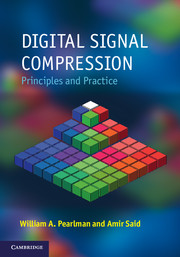Book contents
- Frontmatter
- Contents
- Preface
- Acknowledgments
- 1 Motivation
- 2 Book overview
- 3 Principles of lossless compression
- 4 Entropy coding techniques
- 5 Lossy compression of scalar sources
- 6 Coding of sources with memory
- 7 Mathematical transformations
- 8 Rate control in transform coding systems
- 9 Transform coding systems
- 10 Set partition coding
- 11 Subband/wavelet coding systems
- 12 Methods for lossless compression of images
- 13 Color and multi-component image and video coding
- 14 Distributed source coding
- Index
- References
6 - Coding of sources with memory
Published online by Cambridge University Press: 05 June 2012
- Frontmatter
- Contents
- Preface
- Acknowledgments
- 1 Motivation
- 2 Book overview
- 3 Principles of lossless compression
- 4 Entropy coding techniques
- 5 Lossy compression of scalar sources
- 6 Coding of sources with memory
- 7 Mathematical transformations
- 8 Rate control in transform coding systems
- 9 Transform coding systems
- 10 Set partition coding
- 11 Subband/wavelet coding systems
- 12 Methods for lossless compression of images
- 13 Color and multi-component image and video coding
- 14 Distributed source coding
- Index
- References
Summary
Introduction
Independent scalar quantization of a sequence of samples from a source is especially inefficient when there is dependence or memory among the samples. Even if there is no memory, where the samples are truly statistically independent, scalar quantization of each sample independently, although practical, is a suboptimal method. When neighboring samples provide information about a sample to be quantized, one can make use of this information to reduce the rate needed to represent a quantized sample. In this chapter, we shall describe various methods that exploit the memory of the source sequence in order to reduce the rate needed to represent the sequence with a given distortion or reduce the distortion needed to meet a given rate target. Such methods include predictive coding, vector coding, and tree- and trellis-based coding. This chapter presents detailed explanations of these methods.
Predictive coding
The first approach toward coding of sources with memory is using scalar quantization, because of its simplicity and effectiveness. We resort to a simple principle to motivate our approach. Consider the scenario in Figure 6.1, where a quantity un is subtracted from the source sample xn at time n prior to scalar quantization (Q). The same quantity un is added to the quantized difference ẽn to yield the reconstructed output yn.
Information
- Type
- Chapter
- Information
- Digital Signal CompressionPrinciples and Practice, pp. 116 - 165Publisher: Cambridge University PressPrint publication year: 2011
